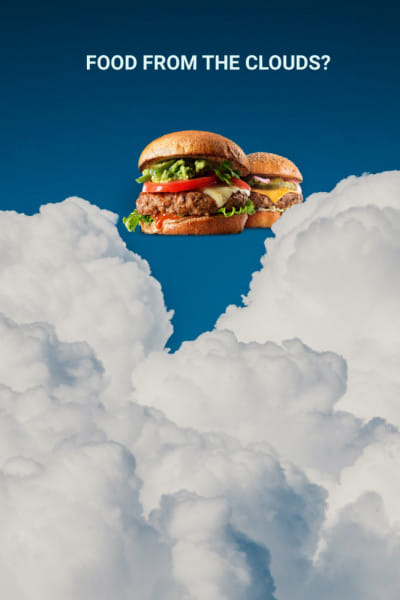Cloud Kitchens: Future of food delivery services

In these dire times of crisis and uncertainties caused by the global Coronavirus pandemic, the world has witnessed major economic turbulence, with several industries failing to cope up with the drastic changes in global lifestyle. On the flip side, there have been a number of online tech-based platforms booming in these times, with the cloud kitchen industry being one of them.
In theory, cloud kitchens are restaurants that solely exist virtually. They offer no dine-ins and are exclusively delivery based with all the orders being received online. Several advantages include- low starting capital and operating costs as costs relating to real estate, interior architecture and the like are eliminated, lower pricing strategies which allow the provision of high-quality food at lower prices and overall enhanced scope for implementing automation. Moreover, cloud kitchens experience faster payback and are more flexible in terms of trying different menu options or changing food brands as a whole due to its single infrastructure. However, the downsides may include low operating costs being substituted with the added technological costs and the increasing need to give enhanced focus on food quality as it becomes the sole judge of the restaurant's overall quality due to the elimination of other factors such as ambience and dine-in experiences.

The cloud kitchen industry emerged with Kludio being the pioneer first-mover with the establishment of its cloud kitchen business in 2019. When asked about the start of this company, Kishwar Hashemee, CEO of Kludio and ex-vice president of Pathao, said "There has been a growing need for delivery optimized food. As demands grow rapidly, restaurants in Bangladesh aren't designed for optimum packaging and delivery as they mostly focus on dine-ins. Moreover, restaurants are risky business but if you take the risk out of the equation, enhanced focus on hygiene with a state of the art kitchen gives customers superior quality food at their very own doorstep." One of the major challenges faced by Kludio was maintaining the quality and consistency of every meal. However, Kludio soon took up the mantra- 'Without consistency, there isn't a brand' and implemented it on a company-wide basis. They ensured superior storage systems, good temperature regulations and focused on dispatching deliveries through the use of artificial intelligence.
As of today, the company has 4 different food brands including Dough on the Go, Hero Burger, Frybox and Deshio within the same infrastructure, operated with its own developed software. As a tech start-up of the country, Kludio believes in collaborative business and hence they have kept their software-based infrastructure open to be used by other prospective cloud kitchens in Bangladesh. They want to facilitate the food delivery ecosystem instead of viewing the industry as a ground for competition. As for prospective businesses, Kishwar Hashemee advised "Don't cut corners to save two pennies. In the food business, hygiene and consistency win. If you make mistakes, be sincerely apologetic to the customers and improve."
With all businesses taking up preventive measures amidst the COVID-19 pandemic, Kludio is trying their best to play their part to slow down the spread. While kitchens and brands are operational, they are keeping the customers' and staff's safety in mind by checking body temperature, stocking up on sanitizers, sanitizing contact areas, wearing hairnets, gloves and masks and washing hands every 15 minutes. In a few months, they will launch their own mobile app to make customers' food experiences better through hygienic production, 5-star customer service and genuine care for food.
After the success of Kludio, a number of other cloud kitchens popped up around the country. With the expansion of this industry, two models are in practice at the moment with the first being cloud kitchens with in-house brands of their own (for instance- Kludio) and the other being cloud kitchens that invite renowned brands to launch in new markets. Following the latter model, Foodpanda Bangladesh is soon launching cloud kitchens across 5 zones with 50 kitchen stalls in Dhaka city with a set plan to launch 30 kitchens across the country with close to 400 kitchen stalls by December 2020. When asked about its launch, Ambareen Reza, Managing Director of Foodpanda Bangladesh said, "The purpose of these kitchens is not only to make food from beloved restaurants from different parts of the city available to customers in these areas but also to allow our top performing restaurant partners who are often small to medium-sized enterprises (SMEs) with limited access to funds, the opportunity to operate from our kitchens and quickly expand their footprint across the country".
While their target group comprises of their existing customers and anyone who values high quality and hygienic fresh food, it aims to give customers the option of a lower basket size i.e. order value thereby making Foodpanda a more inclusive brand with a broader variety of food options for all demographics of the society. As for some advice to prospective startups in this industry, Ambareen Reza added "In Bangladesh and across the rest of the world, the cloud kitchen industry is here to stay and in fact, has hardly even begun to emerge. Although there's no doubt regarding the industry's booming future, startups are advised to have a core sound strategy in place to generate and deliver their online orders before getting started."
From the very start of 2020, the world has been met with drastic changes in lifestyle which in turn has caused changing demands and trends. With the emergence of the coronavirus and social distancing, online delivery platforms have gained further popularity and this trend seems like one that's likely to stay. Thus, it is safe to assume, the future of cloud kitchens in Bangladesh is becoming more and more lucrative, as the idea of high-quality food from the comfort of respective homes seem all the more attractive to consumers all around. All in all, cloud kitchens are on the right track in creating new food designs for delivery and shall continue to prosper in its operations as long as all the players in the economy i.e. the food delivery aggregators and restaurants promise to participate together in harmony.





Comments